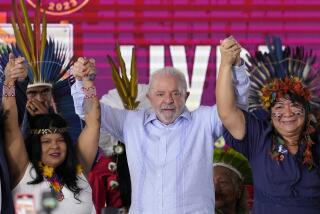S. Africa Black Homeland to Ask Independence
- Share via
PRETORIA, South Africa — The black tribal homeland of Kwandebele announced Wednesday that it will ask the South African government to grant it independence despite strong, often violent opposition to such a move among the territory’s people.
George Mahlangu, chief minister of the territory, said the Kwandebele legislative assembly voted unanimously to seek independence and that negotiations will begin shortly with the South African government.
Kwandebele, an impoverished scattering of about 40 sun-scorched villages northeast of Pretoria, would be the fifth tribal homeland to get nominal independence from the white-led minority government in Pretoria under an old apartheid policy of confining blacks to rural areas and then excising those territories from South Africa.
None of the others--Bophuthatswana, Ciskei, Transkei and Venda--have won international recognition; and with the possible exception of Bophuthatswana, they are now regarded here as largely a political embarrassment as well as a tremendous financial drain. Five other homelands, including the Zulus’ homeland of Kwazulu, have chosen to retain their semiautonomous status within South Africa.
Kwandebele, which has an area of 890 square miles but lacks both natural resources and industry, has a population estimated at 400,000, swelled by thousands of migrant workers from more remote rural areas. Its capital, Siyabuswa, is about 90 miles northeast of Johannesburg.
Residents opposed the plan for independence out of fear that they would become aliens and be barred from working in Pretoria and other nearby cities and towns in South Africa. More than 40,000 Kwandebele residents commute daily to work in Pretoria.
They also feared that the last restraints on the Kwandebele government, already regarded as one of the most brutal in the tribal homelands, would be removed if independence comes. Their fears were heightened by an eight-month reign of terror by conservative, pro-independence vigilantes known as the Mbokhotho.
In voting to seek independence, Kwandebele’s lawmakers overturned as unconstitutional a declaration last August by the then-chairman of the legislative assembly that there was a consensus among its members to abandon Kwandebele’s independence plans because of local opposition.
Opponents in Detention
The new move was made, however, while leading opponents of independence, including the former legislative assembly chairman and senior princes of the Ndebeles’ royal Ndzundza clan, were being detained without charge by the police under South Africa’s state of emergency. Four assembly members, including the Ndzundza crown prince, were expelled from the legislature before the decision in what was also described as a unanimous vote.
Prince Cornelius Mahlangu, a former minister of health in the territory and one of those expelled from the assembly, warned that the move toward independence could quickly bring renewed unrest to Kwandebele, where more than 160 people died in almost daily clashes over the issue from January to August last year.
But George Mahlangu, 36, a lawyer and businessman who in November was elected chief minister to succeed the late Simon Skosana, the original proponent of Kwandebele independence, apparently believes that the state of emergency, which gives the police and army what amount to martial-law powers, will be sufficient to curtail the opposition to independence.
Opposition Alliance
The opposition came from an unusual alliance of traditional tribal leaders, whose politics are generally conservative; militant youths, many of whom came home from school to fight the Mbokhotho; white farmers, who feared the turmoil that independence would bring, and most of the area’s clergy, medical workers, teachers and civil servants.
On Wednesday, heavily armed police patrolled Siyabuswa, the capital, and its few market towns, according to residents contacted by telephone. Newsmen have been prohibited under emergency regulations from entering the area, and they were turned back at gunpoint Wednesday on two main roads into Kwandebele.
“They look like they are expecting a war,” a Catholic missionary said, noting the increased deployment of security forces around his church, “and the mood of the people is so angry that they may get one, I am afraid.”
More to Read
Sign up for Essential California
The most important California stories and recommendations in your inbox every morning.
You may occasionally receive promotional content from the Los Angeles Times.







